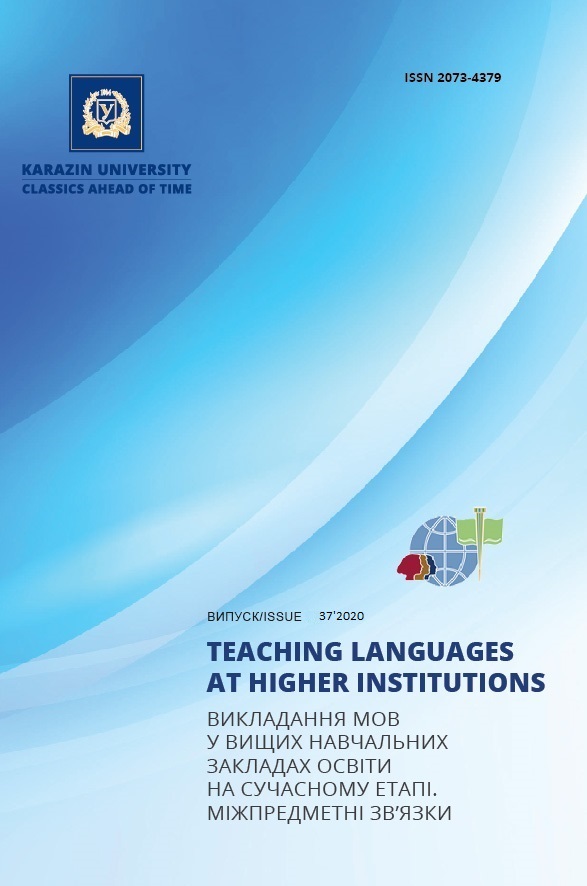Forming verification mechanisms in a dialogical contact
Abstract
The article deals with issues of manipulative influence on the mind of an interlocutor by distortion or hiding of truth and discusses the formation of verifications mechanisms in educational migrants in a dialogical contact. The problem of manipulative strategies and tactics is one of the most urgent in the modern methodology of teaching foreign languages to non-native speakers. The authors analyze research related to ways of distorting the truth for personal gain by the addresser. The speaker can use direct lies to obtain one-sided profit, such lies being a propositional distortion of truth, however, in usual communication, the preference is given to half-truth or omission, i.e. non-propositional distortion of the truth.
The article contains characteristics of the speaker’s claims to the significance of his or her statements, that is their validity, correctness, and truthfulness, as well as replies which are the listener’s reaction in a situation where he or she feels that at least one of the addresser’s claims to the significance of his or her speech act should be verified. Virtually any lexico-grammatical category can be used to distort or verify the truth in various ways. There are special markers that signal the addressee about a possible attempt of the speaker to manipulate the listener’s mind by distorting the truth. An efficient method for the listener to verify a heard message is a correct formulation of questions to clarify and specify the received information. The authors present examples of using speech tactic of soft and hard insistence on a concrete answer to a question and confirmation of the truthfulness of the addresser’s speech act. Working on the development of verification mechanisms in non-native speakers should be an integral part of the problem teaching. When selecting examples to demonstrate techniques of distorting the truth and pushing on the interlocutor, it would be appropriate to give preference to the samples that meet the principle of universality and typicality. Some of the above-mentioned manipulative techniques can be used both negatively and positively if the interacting persons strive to reach the truth by mutual understanding and consensus without an intent to mislead the interlocutor. Only an extreme usage of influence tactics, methods of imposing the addresser’s opinion, or persistent urging the addressee to take a decision the speaker needs, i.e. a psychological pressure on the addressee’s mind, is a signal that necessitates a thorough verification of the speech act of the communication partner.
Downloads
References
Daver, M.V. (2016). Psykholohichni osnovy linhvodydaktychnoyi adaptatsiyi dyskursnoyi stratehiy manipulyatsiyi [The psychological foundations of the linguodidactic adaptation of the discourse manipulation strategy]. Vykladannia mov u vyshchykh navchalnykh zakladakh osvity na suchasnomu etapi. Mizhpredmetni zviazky [Teaching Languages at Higher Institutions]. Kharkiv: V.N. Karazin Kharkiv National University, 28, pp. 47–54 [in Russian].
Lokk, J. (1960). Izbrannyye filosovskiye proizvedeniya [Selected philosophic works]. Moscow: Progress [in Russian].
Martinek, S.V. (2001). Dva aspekta rechevogo vozdeystviya [Two aspects of the speech influence]. Visnyk Kharkivskoho natsionalnoho universytetu imeni V.N. Karazina. Seriia “Filolohiia [The Journal of V.N. Karazin Kharkiv National University. Series “Philology”]. Kharkiv: V.N. Karazin Kharkiv National University, no. 520, pp. 273–277 [in Russian].
Masayiv, M.V. (2012). Rol simvolov yazyka v upravlenii soznaniyem i formirovanii zavisimogo povedeniya [The role of language symbols in the mind control and formation of the dependent behavior]. Yazyk kak instrument i zerkalo epokhi [Language as an instrument and the mirror of an epoch]. Simferopol: Dom Pisateley imeni Dombrovskogo, pp. 159–163 [in Russian].
Nyemtseva, V.V. (1999). Vozmozhnosti manipulirovaniya yazykom [Possibilities of manipulation by language]. Visnyk Kharkivskoho natsionalnoho universytetu imeni V.N. Karazina. Seriia “Filolohiia” [The Journal of V.N. Karazin Kharkiv National University. Series “Philology”]. Kharkiv: V.N. Karazin Kharkiv National University, 448, pp. 319–322 [in Russian].
Ward, L. (2001). Psikhicheskiye faktory tsivilizatsii [The psychic factors of civilization]. St. Petersburg: Piter [in Russian].
Khabermas, Yu. (2000). Moralnoye soznaniye i kommunikativnoye deystviye [Moral consciousness and communicative act]. St. Petersburg: Nauka [in Russian].

